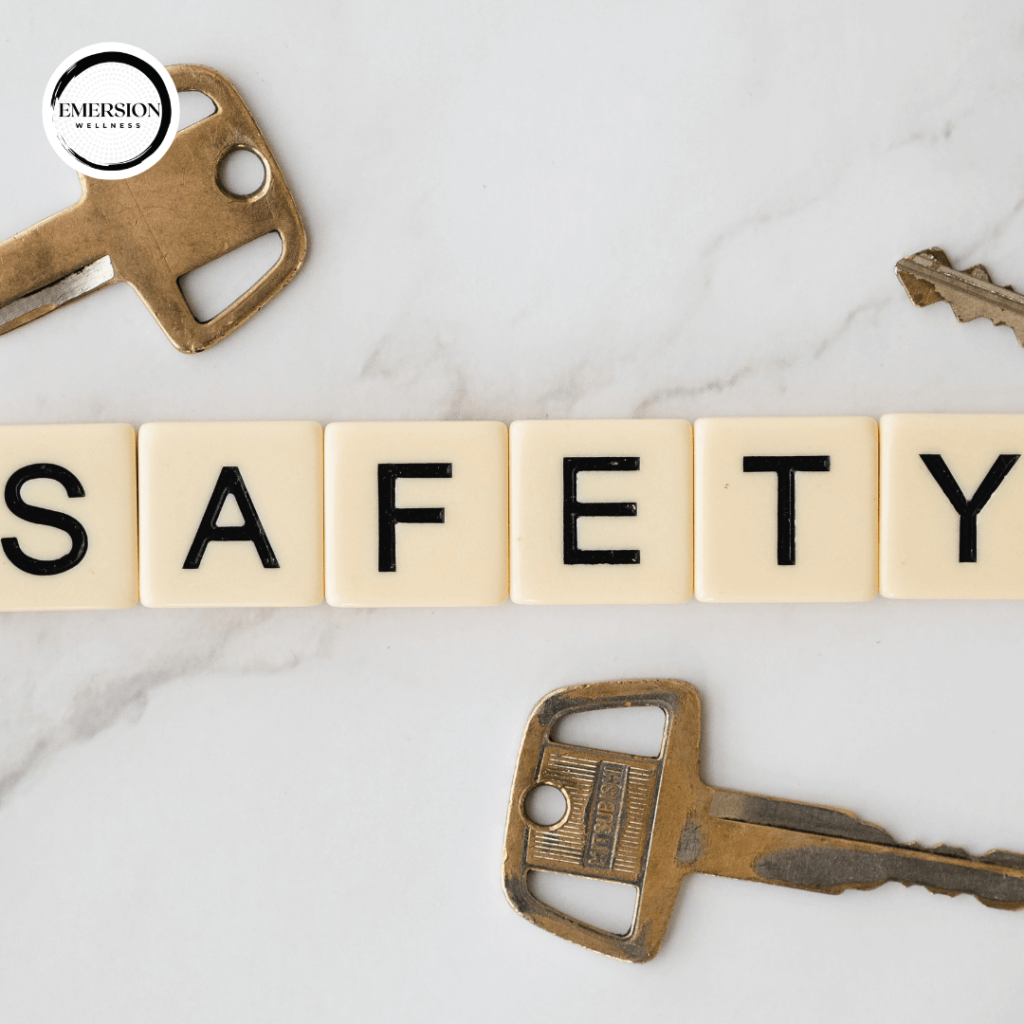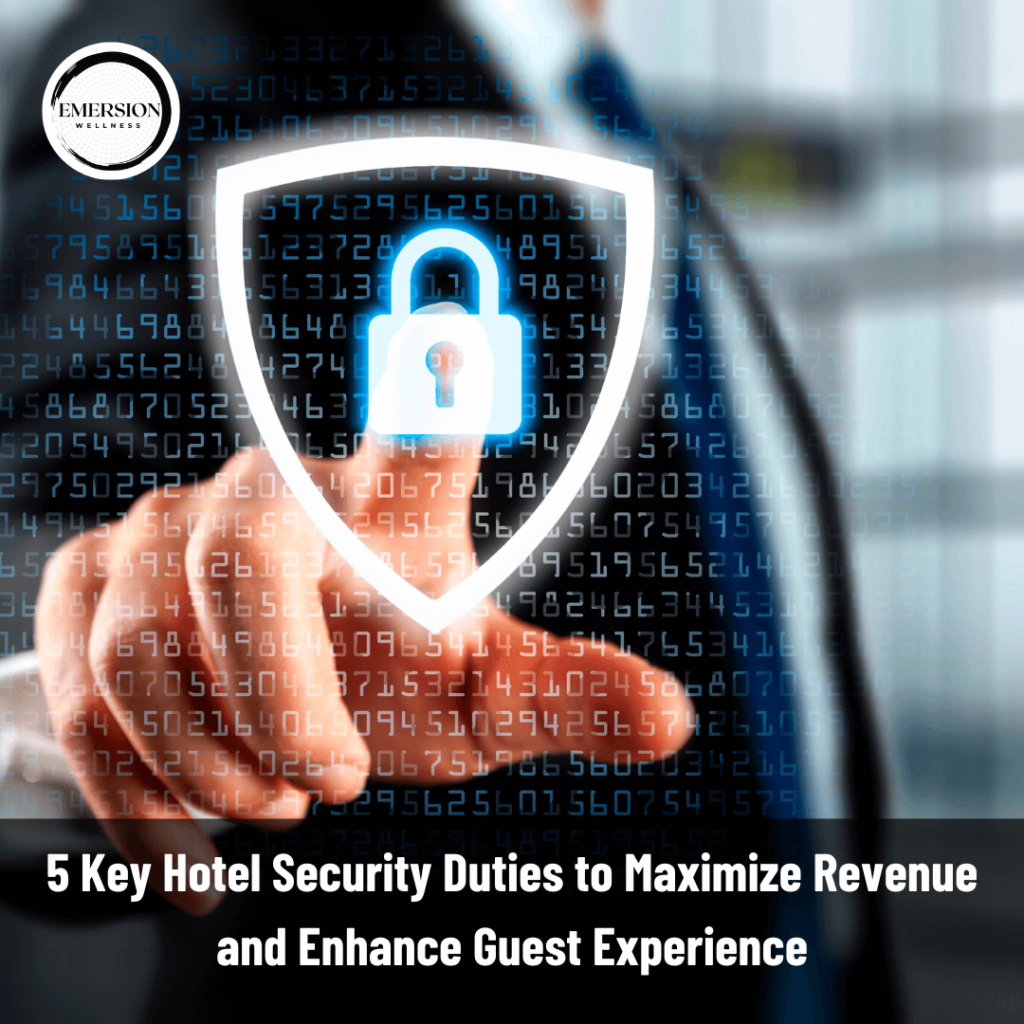Hotel security is more than just preventing theft or vandalism; it's about creating a safe, welcoming environment that enhances the guest experience and boosts your bottom line. At Emersion Wellness, we've seen firsthand how comprehensive security measures can lead to increased bookings, improved guest satisfaction, and higher revenue. This article delves into the essential hotel security duties that can help your property thrive.
Critical Takeaways
- Effective hotel security measures directly impact guest satisfaction and revenue.
- Regular training and updates are crucial for maintaining robust security.
- Advanced technology can optimize security operations and reduce costs.
- A well-rounded security strategy includes physical, digital, and procedural elements.
- Emersion Wellness provides expert guidance on innovative security solutions and revenue-generating strategies.
The Foundation of Hotel Security Duties
Conducting Regular Risk Assessments
Regular risk assessments are crucial for identifying potential security vulnerabilities. This proactive approach allows hotels to address issues before they escalate, ensuring a safe environment for guests and staff. According to a study by Hospitality Net, hotels that conduct regular risk assessments see a 15% reduction in security incidents.
Implementing Comprehensive Surveillance Systems
Surveillance is a cornerstone of hotel security. High-definition cameras strategically placed throughout the property can deter criminal activity and provide valuable evidence in case of incidents. Emersion Wellness recommends regular maintenance and updates to ensure optimal performance of surveillance systems.
Ensuring Access Control
Access control is vital for maintaining security in restricted areas. Key card access systems, biometric authentication, and secure guest check-in processes can significantly enhance safety. A luxury hotel in New York reported a 20% increase in guest satisfaction after implementing advanced access control measures.
Training Security Personnel
Well-trained security personnel are the backbone of effective hotel security. Regular training sessions on emergency procedures, conflict resolution, and technology use ensure that security staff can handle any situation professionally and efficiently.
Advanced Technology in Hotel Security
Leveraging AI and Machine Learning
AI and machine learning technologies are revolutionizing hotel security. These systems can analyze surveillance footage in real-time, identifying potential threats and alerting security personnel. A mid-sized hotel in Chicago saw a 30% reduction in security incidents after integrating AI-powered surveillance.
Utilizing IoT Devices
The Internet of Things (IoT) offers numerous applications for hotel security. Smart locks, connected cameras, and sensor-based alarm systems enhance security while providing valuable data for operational improvements. Emersion Wellness has successfully implemented IoT solutions in several hotels, resulting in enhanced security and operational efficiency.
Enhancing Cybersecurity Measures
With the increasing reliance on digital systems, cybersecurity is a critical aspect of hotel security. Implementing robust firewalls, encryption, and secure Wi-Fi networks protects guest data and prevents cyberattacks. According to a report by Cybersecurity Ventures, cybercrime costs are expected to reach $10.5 trillion annually by 2025, highlighting the importance of strong cybersecurity measures.
Integrating Security Systems
Integrating various security systems into a centralized platform allows for better coordination and response. This approach provides a comprehensive view of the property's security status and enables efficient management of security resources.
Also, see 6 Essential Steps: Creating a Hotel Security Checklist Template to Maximize Revenue
Guest and Staff Safety Procedures
Developing Emergency Response Plans
An effective emergency response plan is essential for guest and staff safety. This plan should cover various scenarios, including fires, natural disasters, and medical emergencies. Regular drills and training ensure that everyone knows their roles and responsibilities during an emergency.
Conducting Safety Drills
Safety drills help prepare staff and guests for potential emergencies. Regularly scheduled drills, including fire evacuations and lockdown procedures, ensure that everyone is familiar with the protocols and can respond quickly and calmly.
Providing Clear Communication Channels
Clear communication channels are vital during emergencies. Ensure that staff and guests can easily communicate with security personnel and receive timely updates. Two-way radios, intercom systems, and mobile apps can facilitate efficient communication.
Ensuring First Aid Readiness
Having well-stocked first aid kits and trained personnel on-site is crucial for handling medical emergencies. Regularly check and replenish first aid supplies, and provide staff with first aid training to ensure they can respond effectively to medical incidents.

Physical Security Measures
Implementing Perimeter Security
Perimeter security is the first line of defense against unauthorized access. Fencing, security gates, and surveillance cameras around the property perimeter can deter intruders and enhance overall security.
Securing Entrances and Exits
Controlled access to entrances and exits is crucial for maintaining security. Security personnel or electronic access systems should monitor these points to prevent unauthorized entry. A study by the International Journal of Hospitality Management found that hotels with controlled access reported fewer security incidents.
Enhancing Lighting and Visibility
Proper lighting around the property, especially in parking areas and pathways, can deter criminal activity and enhance guest safety. Motion-activated lights and well-lit common areas create a secure environment.
Installing Alarm Systems
Alarm systems provide an additional layer of security by alerting staff to potential threats. Intrusion alarms, panic buttons, and smoke detectors should be strategically placed throughout the property to ensure comprehensive coverage.
Maintaining Security Protocols
Conducting Regular Security Audits
Regular security audits help identify potential weaknesses and areas for improvement. These audits should include physical inspections, policy reviews, and system tests to ensure all security measures are effective and up to date.
Updating Security Policies
Security policies should be reviewed and updated regularly to reflect new threats and technologies. Clear, well-communicated policies help ensure that all staff understand their roles and responsibilities in maintaining security.
Ensuring Compliance with Regulations
Compliance with local, state, and federal regulations is essential for hotel security. Regularly review and update security practices to ensure they meet all legal requirements and industry standards.
Investing in Ongoing Training
Ongoing training ensures that security personnel stay current with best practices and new technologies. Regular training sessions and certifications help maintain a high standard of security and professionalism.
Conclusion
Effective hotel security duties are essential for ensuring guest safety, enhancing satisfaction, and boosting revenue. By implementing comprehensive security measures, conducting regular training, and leveraging advanced technologies, hotels can create a safe and welcoming environment for guests and staff. At Emersion Wellness, we specialize in innovative security solutions and revenue-generating strategies tailored to the hospitality industry. Contact us today to learn how we can help your hotel thrive. Additionally, our weight loss program has proven to boost room bookings, spa usage, and food and beverage sales, further increasing your hotel's profitability.
FAQs
Q1: Why are hotel security duties important?
Hotel security duties are crucial for ensuring the safety of guests and staff, enhancing guest satisfaction, and preventing financial losses. Effective security measures can lead to increased bookings and higher occupancy rates.
Q2: What are the key components of hotel security duties?
Key components include conducting regular risk assessments, implementing surveillance systems, ensuring access control, training security personnel, leveraging advanced technology, developing emergency response plans, and maintaining physical security measures.
Q3: How can advanced technology improve hotel security?
Advanced technology, such as AI-powered surveillance, IoT devices, and robust cybersecurity measures, can enhance hotel security by providing real-time threat detection, streamlined operations, and protection of guest data.
Q4: What role does staff training play in hotel security?
Staff training is vital for effective hotel security. Regular training on emergency procedures, conflict resolution, and technology use ensures that security personnel can handle any situation professionally and efficiently.
Q5: How often should hotels conduct security audits?
Hotels should conduct security audits regularly, at least annually, or after any significant changes to the property. Regular audits help identify potential weaknesses and ensure that all security measures are effective and up to date.
Q6: What are some best practices for guest and staff safety during emergencies?
Best practices include developing an emergency response plan, conducting regular safety drills, providing clear communication channels, and ensuring first aid readiness. These measures help ensure a quick and effective response during emergencies.
Q7: How can hotels enhance perimeter security?
Enhancing perimeter security involves implementing fencing, security gates, and surveillance cameras around the property perimeter. Proper lighting and visibility also play a crucial role in deterring intruders and enhancing overall security.
Q8: Why is cybersecurity important for hotels?
Cybersecurity is crucial for protecting guest data and preventing cyberattacks. Implementing robust firewalls, encryption, and secure networks, along with regular security audits and staff training, helps ensure comprehensive protection.
Q9: Can security measures impact hotel revenue?
Yes, effective security measures can positively impact hotel revenue. Enhanced security increases guest satisfaction and trust, leading to higher occupancy rates, positive reviews, and repeat bookings.
Q10: How can Emersion Wellness help enhance hotel security and profitability?
Emersion Wellness offers innovative security solutions and revenue-generating strategies tailored to the hospitality industry. Our advanced security systems improve guest safety, optimize operations, and can be leveraged in marketing efforts. Additionally, our weight loss program boosts room bookings, spa usage, and food and beverage sales, further enhancing hotel profitability. Contact us today to learn more about how we can help your hotel thrive.

I'm Nathan Baws, a nutrition nerd, exercise and weight loss expert, and an unwavering advocate for good health. As the founder of Emersion Wellness, I'm passionate about crafting Seamless Weight Loss Programs to supercharge hotel revenue and transform lives. We've pioneered the World's First Plug & Play Weight Loss Programs for top hotels and resorts, sparking a wellness revolution. Beyond my professional journey, you'll often find me hiking, swimming, and riding the waves, embracing every moment in nature. Join me on this exhilarating journey towards diet, health and wellness.

